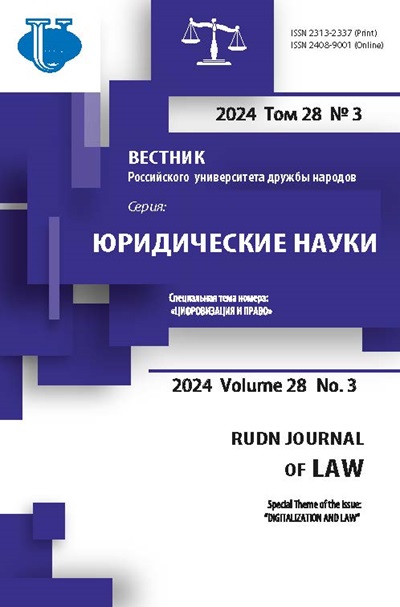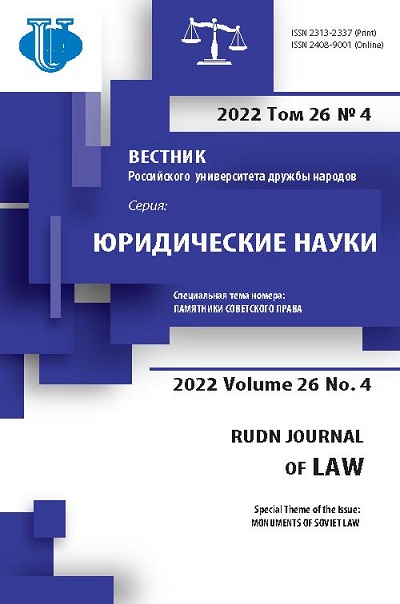Continuity of ideas of the Labor Code of the RSFSR of 1922 by Soviet and post-Soviet labor legislation
- Authors: Lepyoshin D.A.1
-
Affiliations:
- Peoples’ Friendship University of Russia (RUDN University)
- Issue: Vol 26, No 4 (2022): MONUMENTS OF SOVIET LAW
- Pages: 845-860
- Section: CIVIL AND LABOR LAW
- URL: https://journals.rudn.ru/law/article/view/32972
- DOI: https://doi.org/10.22363/2313-2337-2022-26-4-845-860
Cite item
Full Text
Abstract
The article analyzes certain provisions of the Labor Code of 1922, which determined the vector of development of labor legislation in the period of changing political, economic and social conditions. The need for adopting the Labor Code in 1922 was caused by the transition of the Soviet state to a new economic policy. Since 1922, an accelerated process of updating labor legislation began. Some of the norms underlying the Labor Code of 1922 and the Labor Code of 1971 have been reflected and developed in the current Labor Code of the Russian Federation, e.g., the rules on terminating employment contract by parties’ agreement, differentiation in the legal regulation of labor, labor discipline, and others. The article investigates the legal position of the Constitutional Court of the Russian Federation, which had an important impact on the development of sectoral legislation, including, on recognizing part 1 of Article 392 of the Labor Code of the Russian Federation regarding the period for applying for moral damage compensation as contradicting the Constitution. Explaining the provisions of labor legislation, the Supreme Court of the Russian Federation also pays attention to the enforcement of provisions on compensation for moral damage in labor disputes. The article analyzes amendments to Article 263 of the Labor Code of the Russian Federation, allowing to conclude that those labor law norms continue to be updated.
About the authors
Dmitrii A. Lepyoshin
Peoples’ Friendship University of Russia (RUDN University)
Author for correspondence.
Email: lepeshine@mail.ru
ORCID iD: 0000-0001-5198-0860
Candidate of Legal Sciences, Associate Professor, Law Institute
6 Miklukho-Maklaya str., Moscow, 117198, Russian FederationReferences
- Andrianovskaya, I. I. (2010) Continuity in labor law: monograph. 2nd ed., revised. and additional. Yuzhno-Sakhalinsk, Sakhalin State University. (in Russian).
- Andrianovskaya, I.I. (2021) Development of modern labor law in Russia: continuity and novelty. Yuridicheskaya tekhnika. (15), 79-84. (in Russian).
- Davidyan, G.M. (2017) Secrets of longevity of the Labor Code of 1922. Labor law in Russia and abroad. (2), 20-23. (in Russian).
- Dudin, M.N., Frolova, E.E. & Kuznetsov, M.N., et al. (2016) Russia in Global Economy and International Relations: Economic Aspect of Social and Economic History of the 2nd Half of the 19th Century. International Journal of Economic Research. 13(9), 3803-3813.
- Filippova, M.Yu. (2007) Legal regulation of labor discipline of railway workers: historical and modern aspects. Transportation Law. (3), 26-30. (in Russian).
- Ivanov, A.B. (2013) From the history of the preparation of the Labor Code of the RSFSR of 1922. Labor law in Russia and abroad. (2), 19-23. (in Russian).
- Kaminskaya, P.D. (1927) Essays on labor law. Moscow, Legal publishing house NKYu RSFSR. (in Russian).
- Kiselev, I.Ya. (2001) Labor law of Russia. Historical and legal research. Moscow, Norma Publ. (in Russian).
- Kiselev, I.Ya. (2005) Comparative labor law: textbook. Moscow, Prospekt Publ. (in Russian).
- Lushnikov, A.M. (2017) The history of the development of labor legislation in Russia. In: Lutov N.L. (ed.). Actual problems of labor law: a textbook for masters. Moscow, Prospekt Publ. pp. 9-45. (in Russian).
- Umetbaeva, Yu.I. (2012) Development of labor legislation in the context of the new economic policy. Economics and Law. New university. 1(11), 35-37. (in Russian).
- Varshavskii, K.M. (1923) Employment contract under the Labor Code of 1922. Petrograd, Academia Publ. (in Russian).
- Vinokurov, V.A. (2005) State encouragement in the labor law of Russia. Modern Law. (2), 48-51. (in Russian).
















